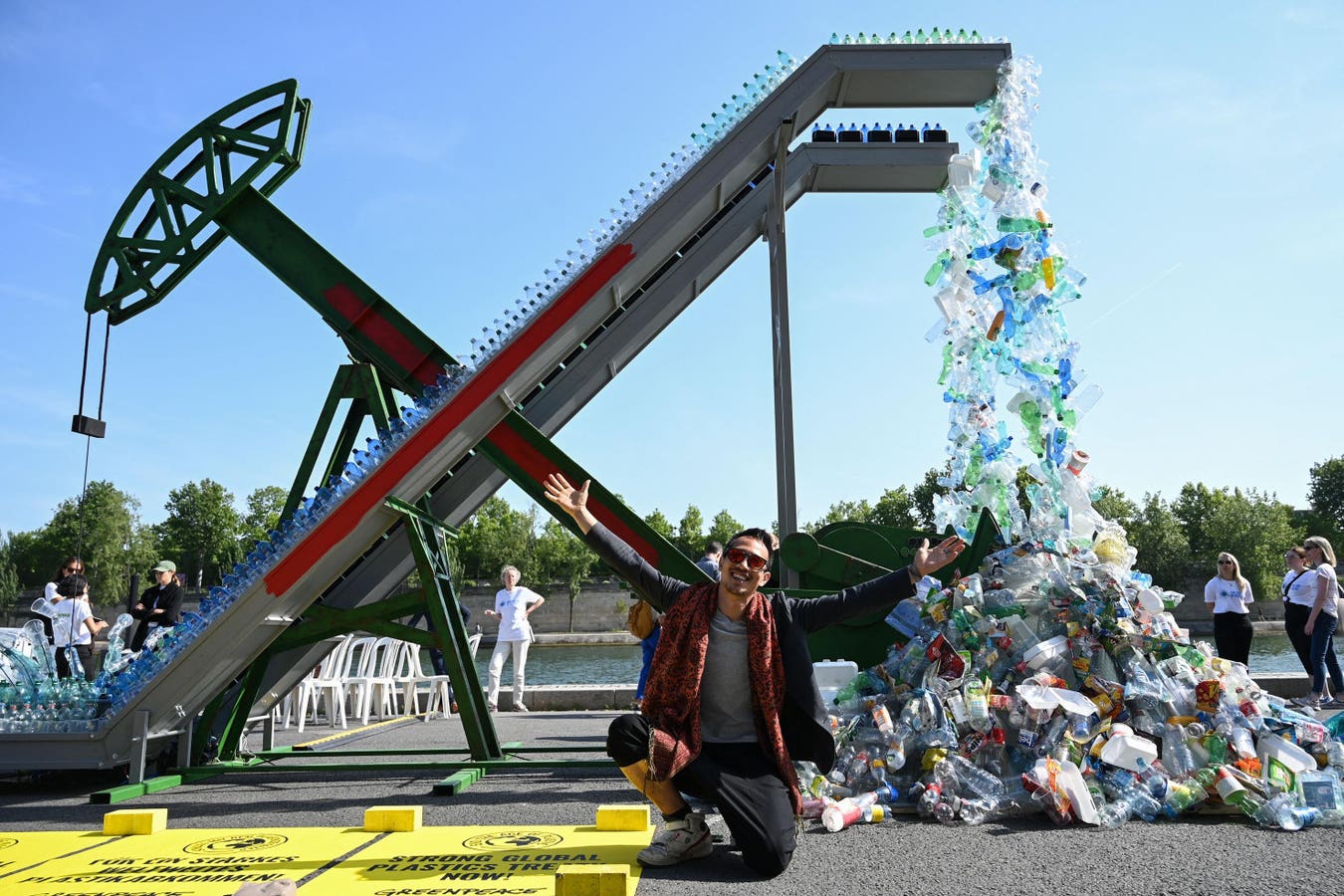Canadian artist and activist Benjamin Von Wong at the unveiling of his art installation “Perpetual Plastic Machine” on the banks of the Seine River in Paris on May 27, 2023, to support the Global Plastics Treaty (Photo by Bertrand GUAY / AFP) (Photo by BERTRAND GUAY/AFP via Getty Images)
AFP via Getty Images
The latest multilateral environmental treaty being negotiated by the United Nations has just encountered a major setback in negotiations. The Global Plastics Treaty negotiations stalled when Saudi Arabia, the United States and a coalition of petrostates refused to compromise on the demand by environmentalists and like-minded states to set production caps on virgin plastic production. Negotiation theorists use a term called the “Zone of Possible Agreement” (ZOPA) to consider what is also the “Best Alternative to a Negotiated Agreement” (BATNA) for various parties. For fossil fuel producing countries, the ZOPA has always involved the freedom of production with a focus on downstream management and responsible consumption. The converse is true for environmental consensus for much of the rest of the world which sees production caps as necessary, given functional inability to recover and recycle more than 70% of plastics worldwide.
There has thus been no common “ZOPA” between the fossil fuel producing countries and the rest of the world regarding the issue of production caps. Furthermore, the “BATNA” or “walkaway” alternative for the fossil fuel producing countries is very high. In other words, a breakdown in talks would have a relatively low impact on the fossil fuel producers and hence they are far less likely to compromise. Since such treaties are inherently consensus-driven documents, even a majority opinion in one direction does not matter. This makes the likelihood of an agreement only possible if some other creative solution is found on the consumption side by the majority contingent. With most environmental treaties, a key challenge to the consensus approach is that there are thresholds and tipping points which can lead to irrevocable change that are at odds with the timeframe or the particular stances of individual countries. Larry Susskind and I explored this challenge in our book Environmental Diplomacy more than a decade ago.
The good news is that the production of plastics per se does not translate into direct tipping point thresholds on emissions which the climate change treaty, or indeed the ozone treaty entailed. The ozone treaty (which remains the only UN treaty ratified by all member states) also involved chemicals that had strong industrial lobbying support. However, thankfully, the same companies that produced those chemicals, such as Dupont, found suitable and profitable alternatives. The plastics treaty has petrochemical lobbying as a common hurdle to its success but unlike climate change, plastics production itself is not a direct tipping point agent. Indeed, the argument is often made by industry that plastics can sequester carbon from fossil fuels for the very long term, unless they are burned. Of course, plastic pollution can lead to biodiversity loss and impact other tipping points indirectly, but the situation is qualitatively different from direct tipping point impacts from emissions. Regarding concerns arounds biodiversity, another way to approach the issue is through a new protocol within the Convention on Biological Diversity.
To salvage the plastics treaty itself, there needs to be a willingness to reconsider the original maximalist approach, spurred by well-intentioned but idealistic environmentalism. While many plastics are rightfully pariah products, there is little doubt that synthetic polymers (the chemical name for what we call “plastics”) have in aggregate transformed our lives positively in myriad ways. From more sanitary and reliable health care products to light-weight (and hence energy efficient) infrastructure, plastics have been just as transformative in their benefits to humanity as bronze or copper or iron. Many years ago, I came across a paper in the Philosophical Transactions of the Royal Society which traced the history of plastics to the Mesoamerican indigenous people who found a way to string out natural rubber latex from tree sap around the sixteenth century. Rubber is a natural polymer and hence may be considered a kind of bioplastic. Subsequently, chemical innovation led to a bewildering array of synthetic polymers but let us not forget that nature has the potential to deliver us polymers too!
The exclusion of bioplastics from the current treaty is in my view a serious flaw in the proposed agreement. This flagrant exclusion of such a win-win prospect largely stems from the aversion many environmental activists have of any potential solution that might lead to complacence on aggregate consumption. Much as I can sympathize with the need to change human behavior patterns with education and policy interventions, there will always be limits to regulatory absolutism in a liberal society. The Nobel laureate Amartya Sen alerted us to this many decades ago in his essay “The Impossibility of a Paretian Liberal.” While conventional bioplastics are derived from plants and could lead to more agricultural land being used, this is miniscule compared to other uses, and also in many cases the bioplastics can be made from waste material. Furthermore, it is also possible to manufacture biodegradable plastics from petroleum products which could assuage the concern of the petroleum-producing countries.
Environmentalists tend to favor bans over market mechanisms because they provide more certainty of outcome. However, in a world where complete regulatory oversight and enforcement is highly difficult to achieve, we need to focus on policy evaluation data on what has worked. For example, a recent study published in Science which considered the impact of plastic bag bans versus plastic bag pricing found that the pricing was more effective in reducing coastal pollution from these products. This may have to do with the pricing leading to people valuing the bags for reuse. Fees can provide funds for cleanup activities. If the plastics treaty is to be salvaged, the United Nations Environment Programme and its affiliate organizations that are managing this process will need to have such a data-driven approach that can allow for integrative solutions beyond fear or favor of uncompromising activism.









